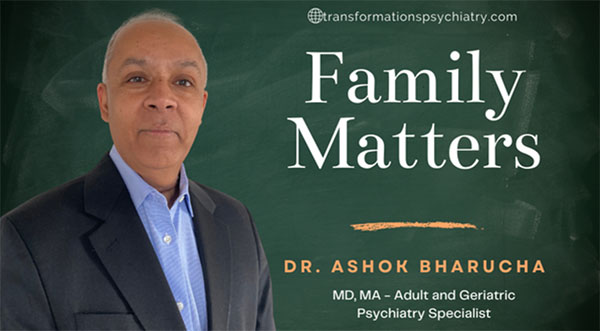Dr. Ashok Bharucha Explains What to Do When You Think a Family Member Has Dementia
By Space Coast Daily // March 21, 2023

Dementia is a term that describes several subtypes of progressive cognitive decline, including Alzheimer’s disease.
It affects millions of people globally, and even though it’s more common in older people, the loss of cognitive function it causes is not a normal part of aging. Memory loss does not always signify dementia, but it is one of the main signs of the syndrome.
In this review on the diagnosis and management of dementia, the authors stress that finding the cause of dementia requires a thorough search into the person’s medical history. It also entails a cognitive and physical examination, laboratory testing, and brain imaging.
Dr. Ashok Bharucha from Transformations Adult & Geriatric Psychiatry says, “When you suspect a family member has dementia, the faster you act, the better the chances of slowing the progress and helping to maintain a better quality of life for longer.”
Symptoms of Dementia
Dementia symptoms are gradual but progressive, including changes in cognition, behavior, emotions, and function. According to Dr. Ashok Bharucha, these are the warning signs to look for:
Memory affecting day-to-day capacities
Even though it’s normal to forget things occasionally and remember them a bit later, with dementia, people forget things more often and struggle to recall something they learned recently.
You will also notice them struggling with familiar or routine tasks like getting dressed, preparing a meal, or playing a game.
Signs of language problems
The person may find it difficult to hold a conversation because they forget even simple words or add words that don’t fit. You may also find it difficult to follow what they are saying.
General confusion
It’s normal to forget why we went into a room sometimes. However, a person with dementia may get lost in their own street or may not remember how they got home. You may also notice that they struggle with simple calculations or recalling common symbols.
Changes in judgment
We can all make questionable decisions from time to time, but in a person living with dementia, you will notice drastic changes in their decision-making. For example, they may wear winter clothes on a warm day.
Misplacing items
Most of us can misplace something temporarily, but when someone starts placing things in odd places where they don’t belong, it’s time to worry.
Mood and personality changes
Severe mood swings for no apparent reason can indicate that someone is living with dementia. Additionally, you may notice personality changes that include sudden fearfulness, lack of interest, suspicion, and may appear withdrawn. It’s common to see a loss of initiative in social obligations, housework, or business activities.
What to Do When You Suspect Dementia in a Family Member
“A dementia diagnosis is terribly upsetting for the person and their family,” says Dr. Bharucha, “since it causes anxiety about the future.” He adds, “However, it is also tough to broach the subject with someone experiencing the symptoms. Time is of the essence, and you need to get them to agree to seek help.”
Dr. Bharucha suggests taking the person to a familiar place where they feel comfortable before broaching the subject of your observed symptoms. Keep calm throughout the conversation, and don’t rush them as you ask them if they have also noticed their symptoms.
The next important step before considering its management is to get the diagnosis. Each dementia patient will face a unique situation. Therefore, there is no one-size-fits-all solution for how you will adapt to the situation. However, a doctor and psychiatrist provide professional care and can help the caregiver and patient through consistent support.
Besides always being there to help, ensure your family member can access non-pharmacologic and pharmacologic help to alleviate their symptoms.
These include physical and cognitive exercise. Make sure the person eats and sleeps well. You will have to make plans to ensure their safety both in and out of the home and ensure they have proper personal hygiene through the progression of dementia. Finally, meet the person’s psychological health needs by planning enjoyable activities.
All this entails care, and you must effectively provide the planning to ensure you have all the directives in place for their medical, long-term health care, and financial allocations. As the disease progresses, plan how you will communicate. There are cases where it becomes difficult, for example, dementia-driven sexual abuse happens at times. Even in cases of Alzheimers, sexually inappropriate behavior has been reported.
Final Take
The risks of dementia vary, and there is still no cure. However, several treatment options can help with the symptoms of its many diseases and associated conditions.
If you plan to become your family member’s caregiver, remember to seek care and support for your physical and emotional health.











